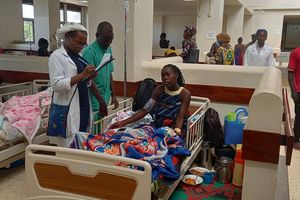
Health workers prepared babies for phototherapy at Kawempe National Referral Hospital yesterday. PHOTOs/Walter Mwesigye
Kawempe National Referral Hospital is currently able to provide intensive neonatal care to only four newborns out of the 30 who require the service.
Ms Catherine Nabbanja, the principal nursing officer, says the hospital has only four fully functional ventilator machines, with the fifth out of use, posing a crisis in critical neonatal care.
A ventilator machine, commonly known as a breathing machine, is one that helps a patient, in this case a critically ill infant, to breathe by taking over the functionality of the lungs, Dr Joel Mirembe, a public health specialist, explains.
Dr Mirembe adds that a ventilator is used when one has a condition that makes it difficult for you to breathe or get enough oxygen into one’s blood.
Kawempe, commonly referred to as the “factory of babies,” registers an average of 57 live births daily and 20,000 every year, with at least 5,000 requiring intensive neonatal care and special care units’ admissions.
This means for one to have a baby delivered at Kawempe, one needs to consider a number of factors whether one’s newborn would survive or die, should a need for critical care arise.
Plight of mother
Barbara Kisitu, not her real name, gave birth at 30 weeks or seven months of pregnancy. Standing outside the entrance to the Neonatal Intensive Care Unit (NICU) Level 5, she waits to check on her newborn who is receiving care at the unit.
“We are told to queue and check on the babies to ensure that they have what to feed on, which is mainly breast milk.”
As we head inside the unit, Ms Kisitu points to her baby from a distance and we notice a health worker attending to it. The joy on her face tells it all because she is able to see her bundle of joy everyday that passes by.
“My baby is not using a machine to breathe, at least, that is what the doctors explained and they said I may be able to start breastfeeding soon,” she says.
For privacy, Ms Kisitu does not consent for her picture to be taken. But inside the room are other newborns also receiving care, some with tubes noticeably running through their tiny nostrils.
The doctors explain that some are feeding tubes but others are supporting the little ones to stay alive by working as their lungs. The reason is that they were born prematurely and are unable to breathe properly on their own.
Ms Nabbanja explains that some of the newborns will, unfortunately, die because they require another 26 ventilator machines to keep them alive.
“The biggest shortage we have are the ventilators in the NICU simply because we receive very many babies. We can even receive up to 30 babies in a day but then you have 5 ventilators so, how will you apportion 5 ventilators to 30. Sometimes we refer them to the women’s hospital but they tell us their vents are full,” Ms Nabbanja says.
“In most cases, we lose those babies not because we don’t know what to do but because we don’t have the ventilators, sometimes we have to get a baby who is performing better off the machine and give chance to another one in more need,” she adds.
Dr Mirembe says the cost of neonatal intensive care in a private setting ranges between 1 to 3 million shillings, a fee exclusive of other required necessities like drugs, medical tests and meals.
Whereas there has been considerable improvement towards reducing newborn mortality, such deaths continue to stick out as a sore thumb, especially when evaluated as an annual figure.
Ministry of Health’s District Health information System data for 2023 showed that Kawempe National Referral Hospital registered 19,440 live births where 2,846 were born live pre-terms.
In the same year, the hospital required to admit 7,780 newborns to the Neonatal Intensive or Special Units where ventilators are key for their survival.
Cost of a Ventilator
Dr Herbert Luswata, the President of the Uganda Medical Association, says the government lacks the commitment to provide quality healthcare.
“When you talk of Kawempe, you’re talking about a national referral hospital, which the government plans for every year, but you wonder why such a hospital can’t have such vital machines, it’s just a lack of commitment,” he says.
The average cost of a ventilator machine on the global market ranges between $20,000 to $55,000 (aboutShs74m to Shs200m). Experts say the prices might differ due improvements in technologies of the machines.
With 1.7 million births per year and 250,000 neonates needing special newborn care services each year, Uganda has a huge burden yet the investment is limited.
According to countdown 2030 data, Uganda experiences 62,000 deaths per year around the time of birth translating into 4,800 maternal deaths, 26,000 stillbirths, and 32,000 neonatal deaths.
Dr Richard Mugabi, the assistant commissioner in charge of reproductive and infant health at the Ministry of Health, says they are cognisant of the need but are limited by the budget.
“We know the need is big but we can only work within the available budget. We continue to engage the government and the Ministry of Finance to increase the budget because that is life-saving equipment,” he says.
Dr Mugabi adds: “We work with partners like Rotary for support where necessary.”
Kawempe National Referral Hospital, lies in the heart of Kampala City, Kawempe Division, approximately six kilometres off the city centre on the Kampala-Gulu highway.




